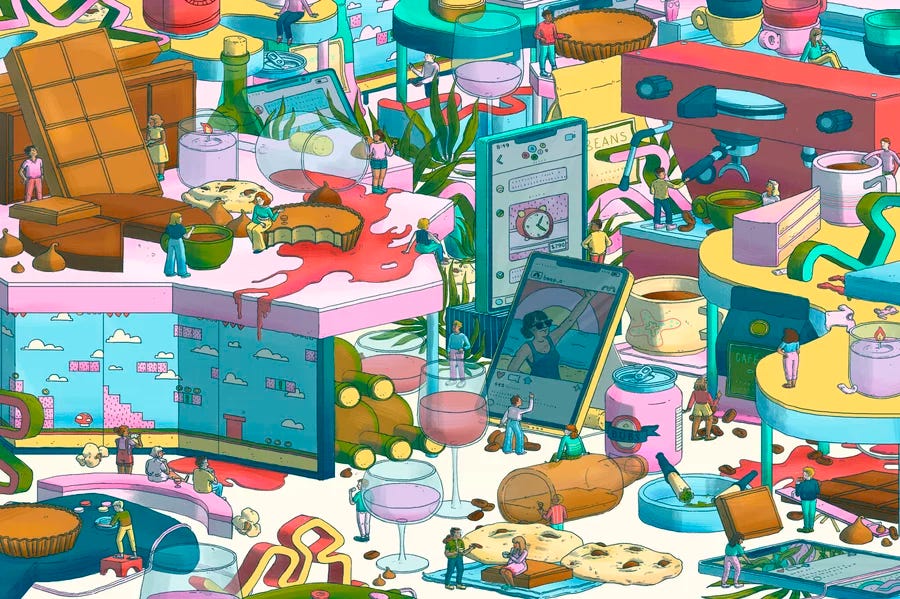Dopamine
Between wrecking sadness and ultimate happiness
Many of you have crossed paths with the term “ Dopamine “ maybe it was from a video promoting cutting on social media or its correlation with drugs, but let’s explore dopamine and how it might affect us positively or negatively.
What exactly is it?
Dopamine is a neurotransmitter and a hormone, it has a vital role in essential body functions such as movement, and memory, in addition to its important part in the | rewards system | in the human brain.1
In brief, Neurotransmitters are chemicals mostly found in the brain which they act on transmitting signals “Messages” between neurons and muscles which our bodies cannot function without.
Rewards system
Without dopamine, life would be literally “Meaningless”, Our brains tend to expect a reward for everything we do, It doesn’t necessarily need to be a tangible reward, mental satisfaction is also considered a “Reward”.
To elaborate, pick anything you do in your day-to-day life, whether it was working or studying or performing a hobby, they all share something in common ( Dopamine ), that football game you play with your friend brings joy Dopamine to you, and the food you enjoy eating, Or even the paycheck you’re waiting for at the end of each month that is leading you to an endless cycle of tireless hours of work to satisfy your brain with a temporal dopamine surge ( Paycheck).
Dopamine deficiency
Low dopamine levels can make us less motivated, hence, we lose the passion towards fulfilling our goals and enhancing our growth, Low dopamine is also linked to serious mental issues such as schizophrenia and depression, not to forget about physical illnesses such as Parkinson’s disease that was caused by severe damage in the nervous system which could cause in Paralysis unfortunately 2
In contrast to Low dopamine, High dopamine levels aren’t always a good thing, when being exposed to high surges of Dopamine we become addicted to maintaining that level of dopamine, that’s the case for drug addicts.
Drugs trigger the brain to secrete unnatural amounts of dopamine, which results in a “Euphoric state”, the addiction to abnormal levels of dopamine will result in our brains getting used to it, And suddenly, it demands for more, this is why quitters are having tough withdrawal symptoms as their brains were used to high levels of dopamine.
We´re addicts too!!
Like drug addicts, we’re addicted to dopamine in one way or another, dopamine is crucial for us and keeping a healthy rate of it would maintain in a healthy productive lifestyle, but overuse of dopamine would make us fall back in terms of self-development and growth.
Take social media for example, there’s no doubt that it can be beneficial for us, as many people depend on it to check the latest news or post their work on it and promote themselves on these platforms, It’s more of a double-edged sword.
But in fact, Social media was created in a way to keep us distracted for longer periods, so they can advertise products to you, it’s their only way to make profits and pay their employees, those companies are trying their best to find ways to keep you hooked to their apps, like the short-videos feature that were introduced to several apps.
Besides, it also hinders our social abilities as we tend to spend more time on the screen, and less on face-to-face interactions.
Illustration of dopamine addiction
— Meredith Miotke , for NPR
Break the cycle of addiction
Dopamine could be very impactful to our growth if we knew how to guide it correctly, as humans, our brains choose instant short-term “feel-good” moments (Instant gratification) over Delayed long-term happiness ( Delayed gratification ), We’re tricked by the YOLO cliché ( You Only Live Once ), and we often think that we’re not going to live achieving our life-goals, But by directing our focus and attention we have better chances of achieving them than standing still.
In conclusion, It’s for us to decide if we could persevere through the increased distractions around us and live to achieve our aspirations, delayed gratification can be difficult and might take a lot of time to see its results, but it´s worthwhile!
Resources :
Ayano G. Dopamine: Receptors, Functions, Synthesis, Pathways, Locations, and Mental Disorders: Review of Literatures. (https://www.hilarispublisher.com/open-access/dopamine-receptors-functions-synthesis-pathways-locations-aondmental-disorders-review-of-literatures-2471-271X-1000120.pdf) J Ment Disord Treat. 2016;2(2):1-4. Accessed 3/23/2022
Briguglio. M., et al. (2018). Dietary neurotransmitters: A narrative review on current knowledge.
https://www.ncbi.nlm.nih.gov/pmc/articles/PMC5986471



THANKS AND GOD BLESS YOU ...